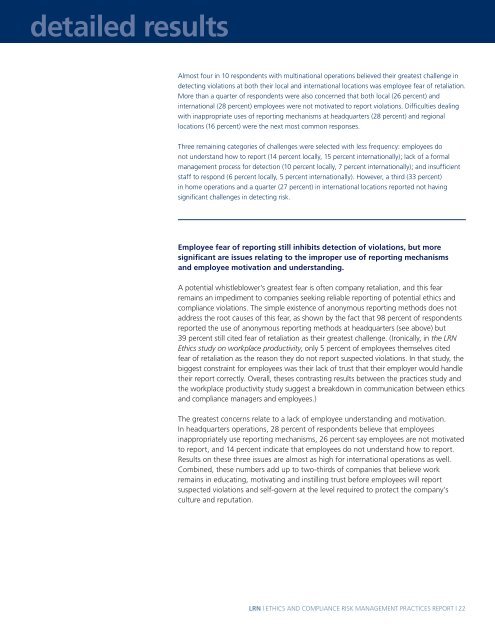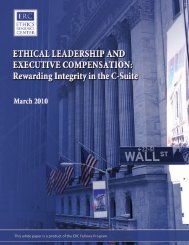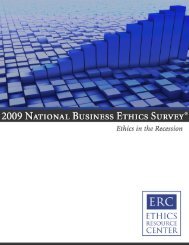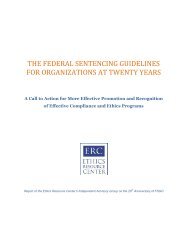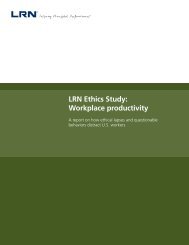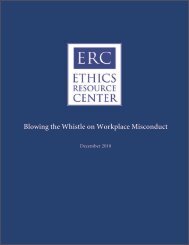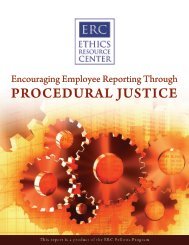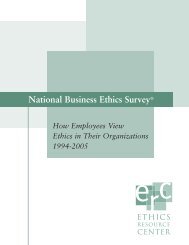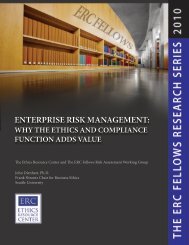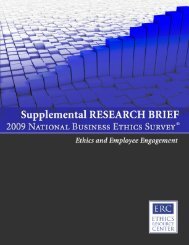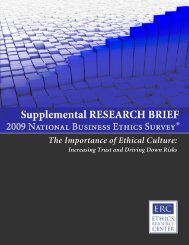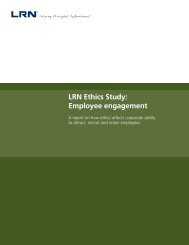LRN - Risk management Survey - Ethics Resource Center
LRN - Risk management Survey - Ethics Resource Center
LRN - Risk management Survey - Ethics Resource Center
- No tags were found...
You also want an ePaper? Increase the reach of your titles
YUMPU automatically turns print PDFs into web optimized ePapers that Google loves.
detailed resultsAlmost four in 10 respondents with multinational operations believed their greatest challenge indetecting violations at both their local and international locations was employee fear of retaliation.More than a quarter of respondents were also concerned that both local (26 percent) andinternational (28 percent) employees were not motivated to report violations. Difficulties dealingwith inappropriate uses of reporting mechanisms at headquarters (28 percent) and regionallocations (16 percent) were the next most common responses.Three remaining categories of challenges were selected with less frequency: employees donot understand how to report (14 percent locally, 15 percent internationally); lack of a formal<strong>management</strong> process for detection (10 percent locally, 7 percent internationally); and insufficientstaff to respond (6 percent locally, 5 percent internationally). However, a third (33 percent)in home operations and a quarter (27 percent) in international locations reported not havingsignificant challenges in detecting risk.Employee fear of reporting still inhibits detection of violations, but moresignificant are issues relating to the improper use of reporting mechanismsand employee motivation and understanding.A potential whistleblower’s greatest fear is often company retaliation, and this fearremains an impediment to companies seeking reliable reporting of potential ethics andcompliance violations. The simple existence of anonymous reporting methods does notaddress the root causes of this fear, as shown by the fact that 98 percent of respondentsreported the use of anonymous reporting methods at headquarters (see above) but39 percent still cited fear of retaliation as their greatest challenge. (Ironically, in the <strong>LRN</strong><strong>Ethics</strong> study on workplace productivity, only 5 percent of employees themselves citedfear of retaliation as the reason they do not report suspected violations. In that study, thebiggest constraint for employees was their lack of trust that their employer would handletheir report correctly. Overall, theses contrasting results between the practices study andthe workplace productivity study suggest a breakdown in communication between ethicsand compliance managers and employees.)The greatest concerns relate to a lack of employee understanding and motivation.In headquarters operations, 28 percent of respondents believe that employeesinappropriately use reporting mechanisms, 26 percent say employees are not motivatedto report, and 14 percent indicate that employees do not understand how to report.Results on these three issues are almost as high for international operations as well.Combined, these numbers add up to two-thirds of companies that believe workremains in educating, motivating and instilling trust before employees will reportsuspected violations and self-govern at the level required to protect the company’sculture and reputation.<strong>LRN</strong> | ETHICS AND COMPLIANCE RISK MANAGEMENT PRACTICES REPORT | 22


